The University of Chicago Medical & Biological Sciences Alumni Association (UChicago MBSAA) honors the contributions of alumni of the Biological Sciences Division and the Pritzker School of Medicine with its Alumni Awards.
The Distinguished Alumni Award recognizes the contributions alumni make to the fields of medicine and science. The Alumni Service Award recognizes contributions alumni make through philanthropy and volunteer service to the University of Chicago. Both awards include a category to recognize early achievements in career and service by alumni who have graduated within the past 15 years.
The 2024 recipients of the Distinguished Alumni Award and Alumni Service Award will receive their awards at the UChicago MBSAA Awards Luncheon on May 18 during Alumni Weekend.
DISTINGUISHED ALUMNI AWARD RECIPIENTS:
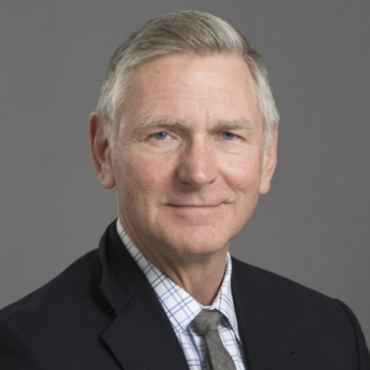
Richard G. Fessler, PhD’80, MD’83
Professor, Department of Neurosurgery
Rush University Medical Center
Dr. Fessler serves as professor of neurosurgery at Rush University Medical Center. Previously, he was professor and vice chair of neurosurgery at Northwestern University and the John Harper Seeley Professor and chief of neurosurgery at University of Chicago Medicine.
He founded and directed the Institute for Spine Care at the Chicago Institute of Neurosurgery and Neuroresearch after serving as director of clinical services and education at the University of Florida Brain Institute. He also held the Dunspaugh-Dalton Chair of Brain and Spinal Surgery and served as professor in the department of neurological surgery at the University of Florida.
Dr. Fessler is internationally known for his contributions to endoscopic and microendoscopic surgical developments, and his pioneering research into human embryonic spinal cord transplantation for the treatment of spinal cord injury. He was co-principal investigator on the first human transplant study to evaluate the safety and efficacy of human embryonic spinal cord transplantation for the treatment of syringomyelia, and is the only physician in the United States to have performed these procedures. More recently, Dr. Fessler was the principle investigator of the Geron and Asterias sponsored studies evaluating the safety of transplantation of the stem cell GRNOPC-1/ASTOPC-1 into humans suffering acute spinal cord injury. The Kambin Foundation awarded Dr. Fessler their annual research award for his research in the field of minimal invasive spinal surgery. He was also asked to deliver the inaugural Rhoton Lecture of the American Association of Neurological Surgeons on these revolutionary surgical techniques.
Dr. Fessler has served on advisory committees for the Food and Drug Administration, the Department of Health and Human Services, and the National Head Injury Foundation. He also lends his expertise to multiple editorial boards and professional journals. In addition to all the above accomplishments, he served as a medical specialist and flight surgeon for NASA/Space Shuttle.
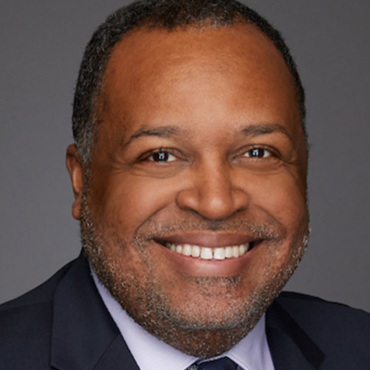
Kenneth Fox, Jr., AB’85, MD’89
Former Chief Health Officer
Chicago Public Schools
Dr. Fox attended the Pritzker School of Medicine at the University of Chicago, trained at Boston Children’s Hospital, and completed his fellowship at the University of Pennsylvania as a Robert Wood Johnson Foundation Clinical Scholar.
He went on to hold faculty positions at Harvard Medical School’s Department of Social Medicine and Boston University Schools of Medicine and Public Health. He returned to Chicago in 2004 to the Erie Family Health Center with appointments at Northwestern Medicine and Lurie Children’s Hospital of Chicago, followed by eight years in private practice with an appointment at the University of Chicago.
Dr. Fox was appointed dually as chief health officer of Chicago Public Schools (CPS) and as a medical officer at the Chicago Department of Public Health in 2016. In this capacity, he was the district’s principal spokesperson on health issues and oversaw a portfolio that included health promotion, health services, health information management, COVID-19 pandemic management, school nursing, and the Children & Family Benefits Unit, which enrolls students and families in public health insurance and the food stamps program. He has championed Medicaid enrollment among CPS students, along with bringing new intensity of focus and resources to connect children to medical insurance, and, in turn, to a “medical home.”
Dr. Fox has written and lectured widely on cultural and social justice issues in healthcare and has collaborated with Partners in Health and Physicians for Human Rights. He is the recipient of fellowships from the Institute for Health & Social Justice, Kellogg, Fulbright, and the Open Society Institute. His interests in global health have also led him to work in Panama, Haiti, the Dominican Republic, and South Africa.
In 2023, he returned to Erie Family Health as a general pediatrician working primarily among Latinx and immigrant populations from across the globe. Dr. Fox has worked to eliminate health-related barriers to learning and to drive better health and educational outcomes for Chicago’s students.
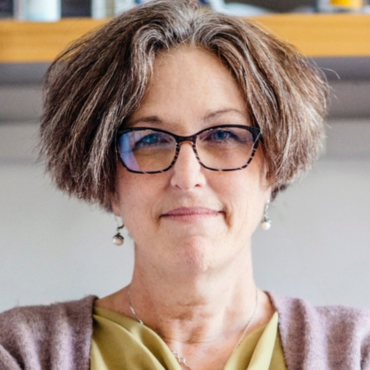
Miriam B. Goodman, PhD’95
Mrs. George A. Winzer Professor of Cell Biology
Professor of Molecular and Cellular Physiology
Stanford University
Dr. Goodman is an award-winning educator, mentor, and activist in support of diversity, equity and inclusion. She earned a bachelor’s degree in biochemistry from Brown University and a PhD degree in neurobiology from the University of Chicago. She completed her postdoctoral training in neuroscience and genetics at the University of Oregon and Columbia University.
Dr. Goodman’s research interests focus on deciphering the molecular events responsible for touch and temperature sensation. Using the nematode C. elegans as a model for sensory transduction, she pioneered the use of physiological methods in combination with genetic dissection. Her research team has applied their expertise to study how sensory neurons are protected from damage caused by mechanical stress or chemical toxins, such as chemotherapy drugs.
Dr. Goodman lives in the San Francisco Bay Area with her husband, David Lenzi, PhD, and their son. She is a professor of molecular and cellular physiology at Stanford University School of Medicine. She currently serves as chair of her department and is the first woman to hold this position. In her role, she has sought to make the department an inclusive research environment for all who are curious.
Dr. Goodman also founded a cohort-based postdoctoral program in interdisciplinary neuroscience. In eight years, the Wu Tsai Neuroscience Interdisciplinary Postdoctoral Scholars program has supported 41 individuals and launched 8 scientists and engineers into independent research careers in academia.
Dr. Goodman educates scientists about the social factors that limit diversity and inclusion within science, technology, engineering, mathematics, and medicine, and partners with social scientists to evaluate programs that seek to retain scientists who belong to underrepresented minorities. Her devotion to outstanding and personalized mentoring was recognized in 2019 with the Landis Award for Outstanding Mentorship from the National Institutes of Neurological Disorders and Stroke.
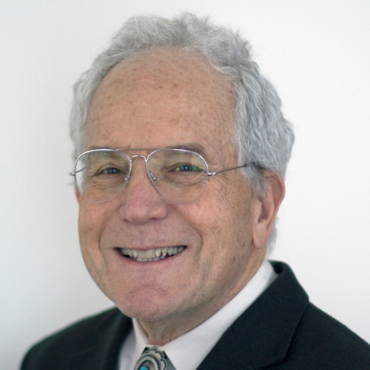
Thomas E. Wellems, PhD’80, MD’81
Chief, Malaria Genetics Section
NIAID Division of Intramural Research, National Institutes of Health
Dr. Wellems received his MD and PhD from the University of Chicago and completed his residency in internal medicine at the Hospital of the University of Pennsylvania.
In 1984, he joined the National Institute of Allergy and Infectious Diseases (NIAID) Division of Intramural Research where he studies the drug responses and disease biology of Plasmodium falciparum and Plasmodium vivax. Findings from his research include the transporter molecule responsible for P. falciparum chloroquine resistance, the molecules responsible for antigenic variation and immune evasion by P. falciparum, a mechanism for sickle cell trait protection against malaria, and the PfHRP-II protein used for malaria rapid diagnostic tests.
Dr. Wellems’ contributions to tropical medicine and parasitology helped understand the genetics of chloroquine resistance, which had developed into a malaria control catastrophe in Africa. Working with scientists in Africa, he showed how children fail chloroquine therapy when their infections carry the drug resistance gene. Diagnostic tests based on his discoveries are now used worldwide.
Dr. Wellems holds elected memberships in the National Academy of Sciences, the National Academy of Medicine, and the American Academy of Arts and Sciences. He is a past president of the American Society of Tropical Medicine and Hygiene and he has served on numerous advisory committees for foundations and public-private partnerships, including the Medicines for Malaria Venture. He has directed the Malaria Genetics Section since 1991 and has served as chief of the Laboratory of Malaria and Vector Research since 2002.
ALUMNI SERVICE AWARD RECIPIENTS:
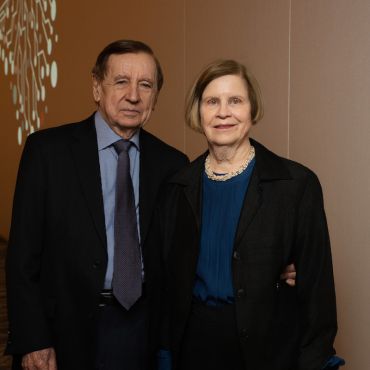
Joan Zajtchuk, SB’60, MD’66
Retired Colonel, US Army Medical Corps
Professor Emeritus, Otolaryngology/Head and Neck Surgery, Rush University Medical Center
Rostik “Russ” Zajtchuk, SB’60, MD’63,
Retired Commanding General, US Army Medical Research and Logistics Command
Professor Emeritus of Cardiovascular Surgery, Rush University Medical Center
Joan Zajtchuk, SB’60, MD’66, and Russ Zajtchuk, SB’60, MD’63, have dedicated decades of volunteer service and philanthropic support to the University of Chicago. Since the early 2000s, the Zajtchuks have served as members of the Division of the Biological Sciences and Pritzker School of Medicine Council.
They have also supported the UChicago Medical & Biological Sciences Alumni Association (UChicago MBSAA), including both as longstanding chairs for their medical school classes and Dr. Russ Zajtchuk serving as president of the UChicago MBSAA Alumni Council from 2007—2009. The Zajtchuks have contributed philanthropically toward multiple areas of the University, including generous support of the Pritzker School of Medicine and the Section of Otolaryngology-Head and Neck Surgery in the Department of Surgery at UChicago Medicine.
Dr. Joan Zajtchuk is a retired colonel of the United States Army Medical Corps. She served as chair and program director of otolaryngology/head and neck surgery and chief operating officer at Walter Reed Army Medical Center, and retired as special assistant to the Army Surgeon General. After her retirement from the Army, she served as associate dean of medical student programs and faculty development at Rush University Medical Center (RUMC). She conducted research on telemedicine information systems—both in the Army and at RUMC.
Dr. Russ Zajtchuk served as chief operating officer at Walter Reed. As a flag officer, he served as commanding general of Brook Army Medical Center and retired as commanding general of the United States Army Medical Research and Logistics Command. After retiring from the Army, he served as vice president of advanced technologies and international health at RUMC. In addition, he served as chair of the National Academy of Sciences Committee on Biological, Chemical, and Nuclear Terrorism. He is a co-founder and former board member of the Rostropovich Foundation.



